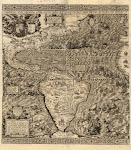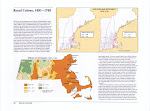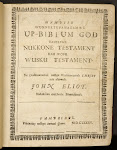During class this week I talked briefly about New France and the role of the French in North America (particularly in the St. Lawrence River valley and around the Great Lakes). In addition you screened Black Robe, a 1991 film about a Jesuit missionary's experiences among the Indians of the region (mostly the Huron and the Iroquois). While the film is fiction, it does shed light on the region, the relationships, the religion and the social/cultural interactions between the groups.
Compare what you saw in Black Robe (particularly the second half of the film - and be sure to use specific details from the film in your post) to what Richter said about the French and missionaries and to what you learned in lecture about the French.
In addition to a few sentences on the topic above, please also be sure to discuss religious practices, the clash of cultures, and rivalries between empires (both European and American Indian).
Showing posts with label American Indians. Show all posts
Showing posts with label American Indians. Show all posts
Thursday, February 4, 2010
Wednesday, January 13, 2010
American Indians and Europeans in the Old New World
One of our focuses this week in class was to address the way we think of early contact and cultural exchange between Europeans, American Indians, and Africans during the sixteenth and seventeenth centuries. To that end, we watched several clips from The New World (2005) and Pocahontas (1995) and we talked about the way that Facing East From Indian Country asks us to reconsider our approach to encounters between Europeans and American Indians and to consider how Indians “discovered” Europeans. In addition, readings in the Rushforth and Mapp collection included a number of primary source documents that provide accounts of European/Native American relations.
Using one of the film clips we watched in class (the links to them are on Blackboard), the chapters we read last week in Facing East, and Cabeza de Vaca’s account of his journey through Florida to the Southwest during the sixteenth century, discuss the ways that Native Americans and Europeans interacted and were envisioned by us and each other.
This doesn’t need to be a long answer – a paragraph or two will do. Just put together a few thoughts about how we think about early American Indian-European relations (with our 21st century perspective in the films), what Cabeza de Vaca says about his encounters with Native Americans (using specific examples from the text); and what Facing East proposes about how Native Americans discovered Europe.
Using one of the film clips we watched in class (the links to them are on Blackboard), the chapters we read last week in Facing East, and Cabeza de Vaca’s account of his journey through Florida to the Southwest during the sixteenth century, discuss the ways that Native Americans and Europeans interacted and were envisioned by us and each other.
This doesn’t need to be a long answer – a paragraph or two will do. Just put together a few thoughts about how we think about early American Indian-European relations (with our 21st century perspective in the films), what Cabeza de Vaca says about his encounters with Native Americans (using specific examples from the text); and what Facing East proposes about how Native Americans discovered Europe.
Subscribe to:
Posts (Atom)

















